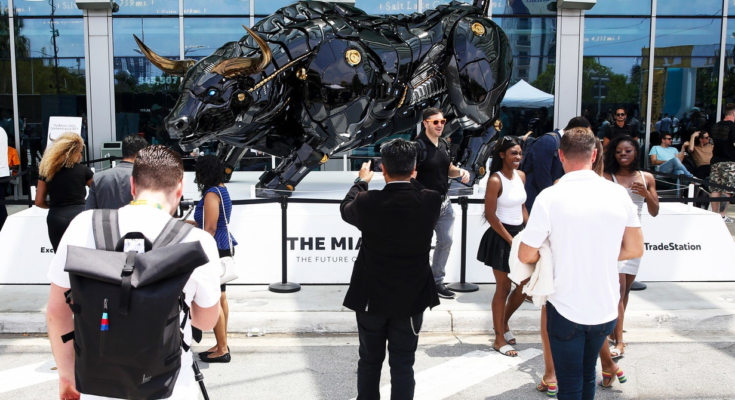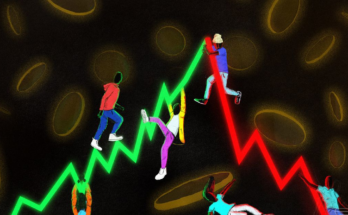Now, even though there are a number of women-focused crypto spaces, Odeniran says women are still underrepresented. “I’ve been in spaces where I’m the only Black person, or the only woman, or the only Black woman,” she says. Odeniran says women need these spaces to get involved, but also for solidarity. Spaces where women are outnumbered can feel exclusive, or worse: unsafe.
After Siegel discovered that a conference organizer had engaged with the harassing tweets, she got a friend to raise the issue once again with an acquaintance who worked for the conference. This time, she got a response. “I apologize that this occurred at our event,” wrote Justin Doochin, the head of events for BTC Inc., “but without this person’s name or email, we have no way of identifying them and preventing them from attending future events.” Siegel wrote back to say that @bitcoin_fuckboi had posted a number of selfies to his account, including with prominent Bitcoin personalities, during the event. She also remembered he rode the mechanical bull at the conference, which would narrow it down to just a few dozen possible attendees.
Meanwhile, David Bailey—the CEO of Bitcoin Inc., the organization that runs the Bitcoin conference—responded to the incident on Twitter. @Chairforce, he wrote, had been “seriously reprimanded but everyone makes mistakes and I’m not firing them for it.” As for the conference itself, he wrote, “26,000 people attended, don’t let a few bad apples color the community.” One woman replied to suggest that women might feel more safe if they had clarity about the conference’s code of conduct. “We have that already,” Bailey responded. (Organizers of the Bitcoin conference declined to answer my questions about how it handles harassment or violations of its harassment policy.)
For Siegel, there’s no way to undo the damage of the harassment she experienced on Twitter. But she still wants the organizers to take accountability for what happened while she was there. “People are underestimating how scary it is to have a conference tell you that if something happens, there will be no course of action,” she says. “The kind of misogynistic joking that you might see on Twitter takes a completely different form when you’re standing in the same room as that man.”
After the conference ended, others began to speak up about the normalization of misogyny in Bitcoin circles. “In the name of 100 million bitcoiners, I’d like to formally apologize for the thousand or so loud bullies who think harassing women IRL is commendable,” one person tweeted. “Those creeps do not represent us and we don’t like them.” Some people replied in solidarity; other replies were less encouraging. “Women is for fucking irl, not bullying, wtf bitcoinbros,” wrote a Twitter user called @insiliconot. The tweet received 21 likes.
A blog post also circulated on Twitter, calling for an end to “rape glorification, misogyny, and sexual harassment” within the Bitcoin community. The author, Tom Maxwell, hosts a podcast about Bitcoin; he says he wrote the post after he heard about what happened to Siegel at the conference. He thought her harassment was unacceptable, but also not surprising. “It was like, here’s another example of this sort of thing going on,” he told me. After he published his blog, some people on Bitcoin Twitter replied and called him “beta” or “a waste of space.” One person told him to kill himself.
Maxwell and other Bitcoin proponents are adamant that the toxicity of certain groups doesn’t represent the entire community. But it can be enough to drive some women out of the space altogether. The woman who found the AirTag in her purse during Bitcoin Week has since decided to leave a job in the industry because of what she sees as toxicity in the community. Siegel, who entered the crypto space in 2017, says she had been looking forward to the community becoming more diverse in recent years. “But I’m afraid that if we continue to lean into that culture, we’ll scare off these women who are getting involved,” she says. “We’re going to backtrack.”



